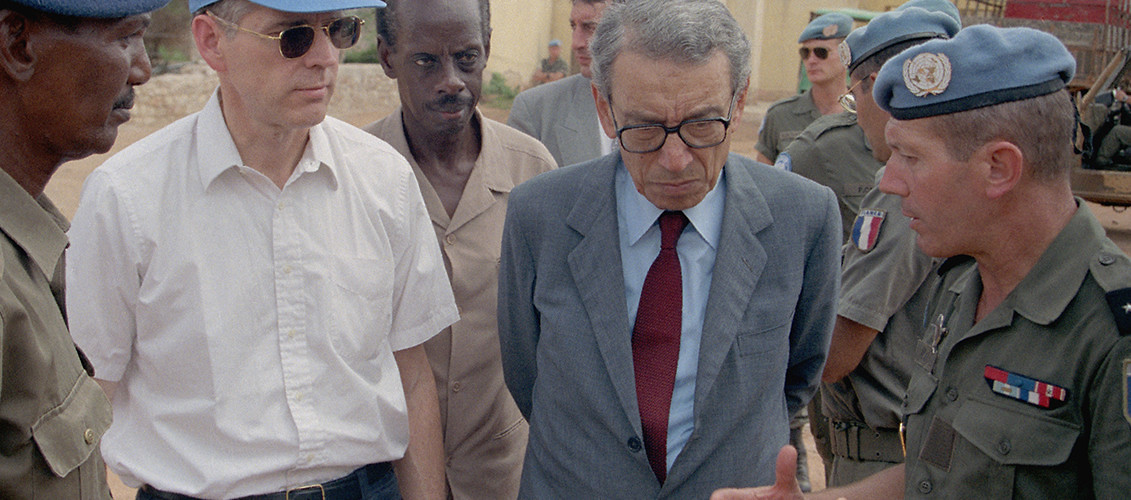Former UN Secretary-General Boutros Boutros-Ghali meets with French peacekeeping command in Somalia. Baidoa, Somalia, October 22, 1993. (F. Ribere/UN Photo)
January 3, 1993: United Nations Secretary-General Boutros Boutros-Ghali arrived in Mogadishu, Somalia, with his senior staff in two small airplanes. He was there to assess the ongoing civil war and associated famine, as 13,000 UN Peacekeepers sought to restore order to the country.
Warlord Mohammed Farah Aideed, in control of much of the city, had not forgotten that Boutros-Ghali—who died yesterday at the age of 93—had been a senior Egyptian government official under Presidents Anwar Sadat and Hosni Mubarak, during which time he had given strong support to ousted Somali President Siad Barre, whom Aideed’s Somali National Alliance (SNA) militia had helped drive from power. The SNA mounted a peaceful protest outside UN headquarters, located in a narrow cul-de-sac, while Boutros-Ghali and I (at that time the senior American representative in the country) visited a refugee center on the outskirts of the city.
Given the situation, we went to the headquarters of the US-led UN mission in Somalia, UNITAF, where Lieutenant-General Robert B. Johnston turned down the Secretary-General’s request to use UNITAF forces, mostly Marines, to end the demonstration. He instead persuaded Boutros-Ghali to proceed directly to Addis Ababa, at which point the demonstration would disperse peacefully. On the way back to the airport, Boutros-Ghali told me that the situation was very bad for the UN, although he played down its significance with the press. It was a humiliation he would not forget.
Five months later, after the murder of 42 Pakistani UN peacekeepers by SNA fighters and several unsuccessful efforts to capture Aideed, the Secretary-General asked Chairman of the Joint Chiefs General Colin Powell to authorize a separate US force of Delta rangers to capture the warlord. This led to the events of October 3-4 1993 known as “Black Hawk Down,” in which 18 American Marines were killed and 78 more were wounded in a bitter nighttime fight, leading President Bill Clinton—under strong Congressional pressure—to announce the withdrawal of US forces from Somalia. By April 1995 the entire UN military operation in Somalia was withdrawn. The collapse of the Somali state and the ensuing violence continued for the next 17 years, until the Transitional Federal Government was set up in Mogadishu.
Boutros-Ghali was a controversial but in some ways prescient secretary-general. Early on, he identified the weaknesses in UN peacekeeping, and later put forth an important set of reforms in his revised Agenda for Peace of 1995. This was a transformative analysis laying out the fundamentals of post-Cold War peacekeeping. Released in the immediate aftermath of the Rwandan massacre, it contained a four-part agenda: prevention, peacemaking, peacekeeping, and post-conflict peacebuilding. This is very much the framework of the current UN peace operations reform agenda. At the same time, his controlling personality alienated many in the UN Secretariat and, most significantly, his relations with the US continued to deteriorate. Strong differences with President Clinton and US Ambassador to the UN Madeleine Albright over his overall management led to the US in 1996, for the first and only time, denying a serving secretary-general a second term.
Boutros-Ghali’s downfall led to the appointment of Kofi Annan as the seventh UN secretary-general. Annan served two terms and took on a major leadership role, denouncing the international failure to prevent genocide in Rwanda and also the UN’s passive role in Srebrenica during the Bosnian war. He called for a new, more resolute UN role in preventing similar events in the future, championing enhanced peacekeeping in Kosovo and East Timor, and ultimately the adoption of the principle of the Responsibility to Protect at the 2005 World Summit.
After leaving the UN, Boutros-Ghali released his memoir Unvanquished: A U.S.-U.N. Saga, defending his record and claiming the Clinton administration had tried to micromanage his role. He said Washington had urged him to stay away from Congress and had not paid its outstanding debt to the UN. In his view, the Clinton administration had failed to support UN interventions, especially in Africa after Somalia, and had failed to take a strong stand in Bosnia until 1994.
Boutros-Ghali went on to head the La Francophonie organization of French-speaking countries, where he had an equally controversial career. He strongly supported the French military and political role in Africa—including deployments in Cote d’Ivoire and Mali—and remained critical of UN interventions in those countries. Most controversially, Boutros-Ghali supported Egyptian General Abdel Fattah al-Sisi’s crackdown on the Muslim Brotherhood and civil society opponents after the Arab Spring, and argued that these measures were necessary to restore peace and security. In April 2015, at a conference in Azerbaijan, he even called for a new organization to replace the UN. This, he said, would include non-state actors and intend “to rejuvenate and democratize this aging intergovernmental organization.”
Even in death, he will be remembered as a powerful, charismatic, and controversial voice.





